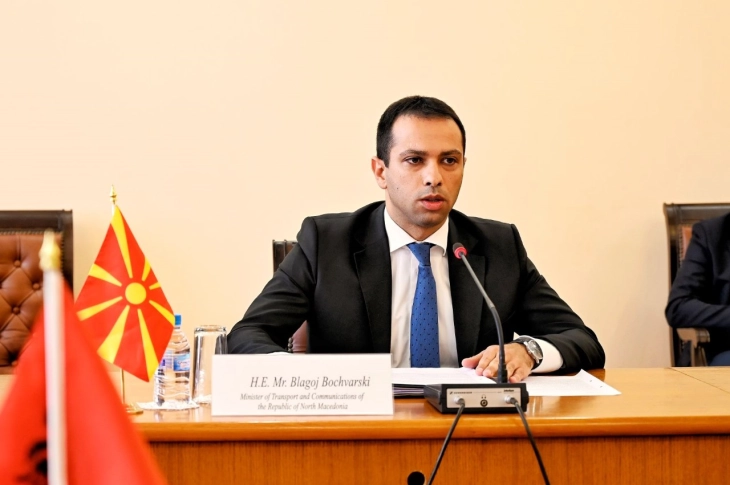Construction of railroad to Bulgaria to resume in Q1 2022

Skopje, 19 October 2021 (MIA) – Minister of Transport and Communications Blagoj Bochvarski expressed Tuesday expectations that a contractor in charge of constructing the first two sections of the railroad to Bulgaria will be selected by the end of the year and construction works will launch in the first quarter of 2022.
“North Macedonia is strongly committed to the EU integration process and the integration of its transport system with those of the countries in the region and the EU,” Bochvarski underlined.
The Minister is paying on Tuesday a working visit to Sofia where he signed with counterparts from Bulgaria and Albania, Hristo Aleksiev and Belinda Balluku, a trilateral memorandum of cooperation, stressing mutual efforts for construction and coordinated development of Corridor VIII. The document sets out clear dates for the development of these three countries and their activities related to Corridor VIII, which according to expectations should be constructed by 2030.
Bochvarski underlined that rail connectivity with Bulgaria to the east and Albania to the west is crucial for the overall development of North Macedonia’s railroad system. The construction of new rails, he added, should ensure faster economic growth in the entire region .
“As a country with EU membership aspirations, we’re strongly committed to regional development through construction and modernization of road and rail infrastructure. The government is implementing policies aimed at completing the construction of Corridor VIII. That’s why me and my Bulgarian and Albanian counterparts signed in Sofia today the memorandum for cooperation in which we pledge development of sustainable road and rail infrastructure on Corridor VIII and reaffirm joint will and readiness for long-term planning and coordinated development of Corridor VIII, with special focus on investment projects of great value to the region,” Bochvarski said.
According to him, North Macedonia is making efforts to wrap up construction of transport infrastructure on the east-west axis. Planned investments for construction of the railway Corridor VIII, he added, surpass EUR 1 billion.
The construction of the eastern section of the railway Corridor VIII has been divided in three sections, Kumanovo-Beljakovce, Beljakovce-Kriva Palanka and Kriva Palanka-the Bulgarian border. Last week, officials signed a contract with the company set to overlook the construction of the first and second sections and the process for selecting a contractor is currently underway. According to Bochvarski, contractors in charge of constructing the first two sections should be selected by the end of the year.
“Construction of the first and second section is set to launch in Q1 2022 and it’s an investment standing at some EUR 200 million,” said the Transport Minister.
Construction works on the third section, from Kriva Palanka to the Bulgarian border, Bochvarski stressed, should start soon and will require joint efforts with Bulgaria to resolve issues arising from tunnels at the border. The construction of the third section of the railroad will cost over EUR 400 million.
The Minister of Transport said that reconstruction of the road infrastructure of Corridor VIII is also underway.
“We’re completely reconstructing the east section, from Kumanovo to the Bulgarian border, by restoring the existing road, but also building an expressway, so investments in the eastern section alone currently stand at EUR 90 million,” Bochvarski noted.
In regard to the western section of Corridor VIII, a project has been set up for construction of a railroad from Kichevo to the Albanian border, stretching 70 km, and stakeholders are currently working on securing funds.
The trilateral memorandum aims to facilitate coordination and implementation of measures for facilitating transit at border crossings and provide corridors for fast and uninterrupted transport of goods. Ensuring sustainable mobility, high efficiency and quality of transport services in the long-run is top priority.







